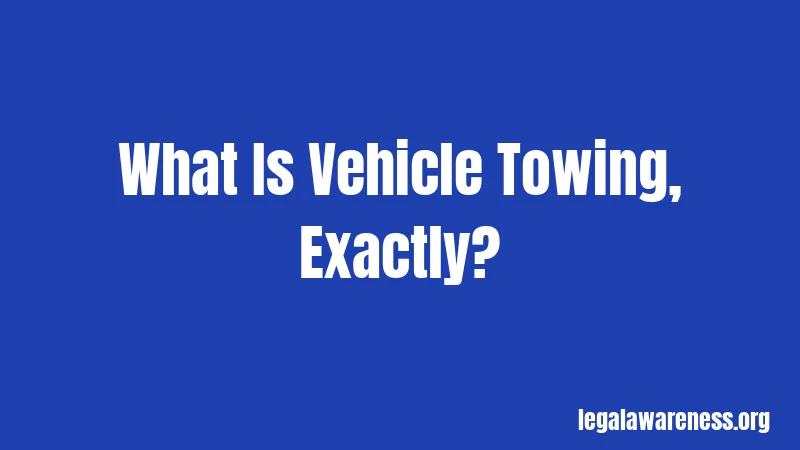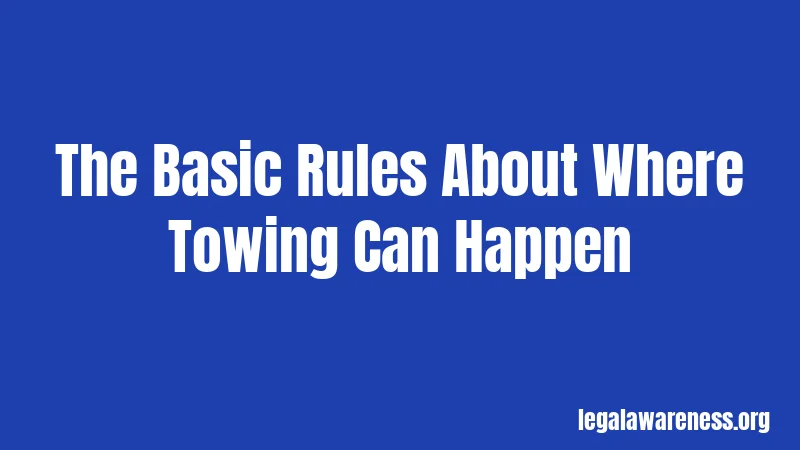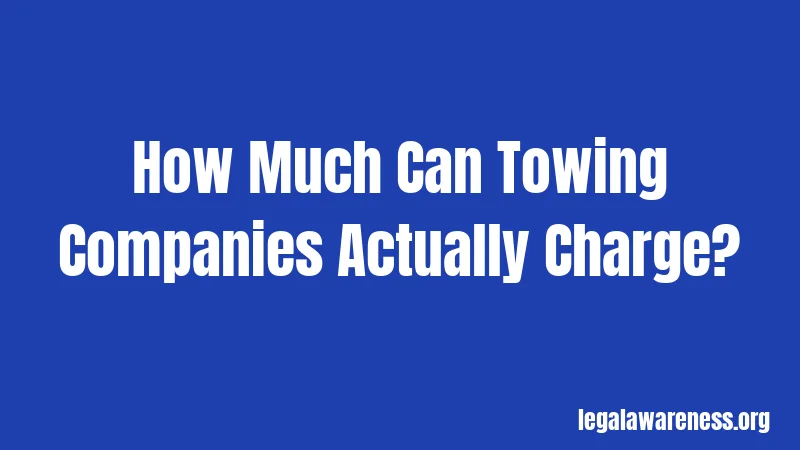Virginia Towing Laws (2026): Know Your Rights Before Your Car Gets Hooked
Most people never think about towing laws until their car gets towed. Then reality hits hard. You’re stuck, confused, and your wallet’s about to take a hit. In Virginia, towing rules are pretty specific. And honestly, knowing them ahead of time can save you major headaches and money.
Here’s the thing: Virginia tows thousands of vehicles every year. Many of those owners had no idea the tow was legal. Others got charged unfair fees they didn’t have to pay. Let’s make sure you’re not one of them.
What Is Vehicle Towing, Exactly?

When someone tows your car, they’re removing it from one place and moving it to another. Usually, this happens without your permission. Pretty stressful, right?
Towing can happen for lots of reasons. Maybe you parked illegally. Maybe you got in an accident. Or maybe your car broke down on a highway and safety crews need to move it. Each situation has different rules.
Who Can Actually Tow Your Car?
Not just anyone can hook up your car and drag it away. Virginia has specific rules about who’s allowed to do the towing. This is important stuff.
Only licensed tow operators can legally tow vehicles in Virginia. These are professional companies that have gone through background checks and gotten state approval. They need proper insurance too. So when you see a random truck operator, they probably aren’t legal to tow your vehicle.
Private property owners can request tows on their own land. Think apartment complexes, parking lots, or store parking areas. They can hire a licensed tow company to remove cars that are parked illegally on their property. But even they have to follow Virginia’s rules about how they do it.
Police and law enforcement can also order tows for traffic violations, accidents, or public safety reasons. These are always legal, even if it stings to pay for it.
The Basic Rules About Where Towing Can Happen

Towing on public roads follows different rules than towing on private property. You need to understand the difference.
On public roads and highways, police or authorized law enforcement can order a tow. They might do this if your car is abandoned, blocking traffic, or involved in an accident. They can also tow if you’re parked illegally or your registration is expired. But they can’t just tow whenever they want. There has to be a legal reason.
On private property, things work differently. If you park on someone else’s land without permission, they can have you towed. Landlords can tow tenant cars that violate parking rules. Businesses can tow cars parked in their lots illegally. But here’s what matters: they have to post proper warning signs first.
Virginia law requires clear signs in the parking area. The signs must tell you that illegal parking will result in towing. They need to show a phone number for the towing company. If there are no signs, the tow might actually be illegal.
Posted Notice Requirements
Wondering if those signs actually matter? They totally do.
Private property owners must post notice about towing before they can legally tow anyone. The sign needs to be clearly visible from where people park. It can’t be hidden or tiny. Drivers need to actually see it and understand what it means.
The sign must include specific information. It has to say that cars can be towed. It needs the name and phone number of the towing company. It should also include the storage location where your car will be taken.
If the signs are missing, damaged, or unreadable, the tow is probably illegal. You might have a case to fight the tow charges. This is huge. Document everything if this happens to you.
How Much Can Towing Companies Actually Charge?

Okay, here’s where people get really upset. Towing fees can add up fast.
Virginia doesn’t set exact price caps on towing fees. But there are some limitations. Tow companies must display their rates. You’re legally allowed to ask what they charge before they tow your vehicle.
For private property tows, the owner and tow company decide the price together. However, the fee must be reasonable. Virginia’s law says tow companies can’t charge excessive or unfair rates. If a charge seems outrageous, you might have grounds to dispute it.
Storage fees are separate from towing fees. Once your car is at the tow lot, you’ll pay daily storage charges. These add up quickly. A typical storage fee is around $15 to $25 per day, but it can be higher. After a certain number of days, the tow company has the right to sell your car if you haven’t paid.
Impound fees are extra charges some jurisdictions add. These cover the cost of managing the impound lot. Not all places charge these, but some do.
Wrecker Service Laws and Your Rights
Here’s where it gets interesting. Virginia has specific rules about how tow operators must treat your vehicle.
Tow companies must operate safely. They can’t damage your car while towing it. They need proper equipment and training. If they damage your vehicle during the tow, you can potentially sue them for the damage.
Your vehicle must be stored securely. The tow lot needs to be a safe place where your car is protected from theft and weather damage. You have the right to see your vehicle when you go to retrieve it.
Tow operators must return your personal belongings. If you left stuff in your car, they can’t keep it. They need to give back anything that was inside.
You have the right to get your car back. The tow company can’t hold it hostage forever just because you can’t pay immediately. There are legal processes for this, which we’ll get into.
When a Tow Is Actually Illegal
Not all tows are legal. Some tow operators break the rules. Knowing the difference is really important.
A tow is illegal if no proper notice was posted. Remember those signs? They’re required on private property. No signs means an illegal tow.
A tow is illegal if the property owner didn’t actually authorize it. Sometimes random tow companies tow cars without permission. This happens, and it’s against the law.
A tow is illegal if the operator isn’t licensed. Virginia requires all tow operators to be licensed. If you can’t verify their license, the tow might not be legal.
A tow is illegal if the reason is discriminatory. A tow company can’t remove your car because of your race, religion, or other protected status.
Stay with me here. A tow might also be illegal if it violates the proper legal procedures. For example, if police didn’t follow the right steps before impounding your vehicle, it could be challenged.
Police and Law Enforcement Tows
Police tows are different from private property tows. There are specific rules that police must follow.
Police can tow your vehicle without prior notice in emergencies. If your car is blocking traffic or creating a public safety hazard, they can tow immediately. They don’t need permission from a property owner in these cases.
For non-emergency police tows, officers still need a valid reason. Your car can be towed if you’re parked illegally, if your registration is expired, or if you’re involved in criminal activity. But again, there needs to be a legal reason.
When police tow your car, they must create a report. You have the right to get that report. This document explains why your vehicle was towed. You’ll need it if you want to dispute the tow later.
Police must notify you about the tow as quickly as possible. They usually do this through a notice on your vehicle or by contacting you directly. You have the right to know where your car is being held.
How to Retrieve Your Towed Vehicle
You’re gonna want to know this part. Getting your car back involves specific steps.
First, find out where your car is. Call the police non-emergency line if it was a police tow. For private property tows, contact the towing company listed on the posted signs.
Get the documentation. Ask for a written explanation of why your car was towed. You need this information.
Gather your payment. You’ll need to pay the towing fee and any storage charges. Some places accept credit cards, but call ahead to confirm.
Go to the tow lot during business hours. Bring your driver’s license and proof of vehicle ownership. You’ll need to pay before they release your car.
Inspect your vehicle carefully before leaving. Check for any new damage. Take photos if there are dents or scratches that weren’t there before. Document everything with dates and times.
Get a receipt for everything you paid. Keep these records. You might need them later if you dispute the charges or claim damage.
How Long Can a Tow Company Hold Your Car?
Not forever, that’s for sure. Virginia has limits on how long tow companies can keep your vehicle.
In most cases, tow companies must release your car once you pay the fees. There’s no long waiting period. If you bring payment, they should give you your car the same day.
For abandoned vehicles, the rules are different. A car is considered abandoned if it’s been in the tow lot for a certain period without contact from the owner. After that time, the tow company can attempt to sell it to recover their fees.
The timeline for abandoned vehicles varies. Typically, a company must try to contact the owner first. They need to make a reasonable effort to find you. Only after these attempts can they proceed with selling the vehicle.
If police have impounded your car for criminal reasons, it can be held longer. The length depends on the case. You’ll need to check with the police department about your specific situation.
Disputes and How to Challenge a Tow
Think the tow was illegal? You have options. Virginia lets you challenge an improper tow.
First, gather evidence. Get photos of the parking area. Document whether warning signs were posted. Write down the date, time, and location. Get the tow company’s name and license number. Talk to anyone who witnessed the tow.
Send a written complaint to the towing company. Explain why you believe the tow was illegal. Include all your evidence. Keep a copy for your records.
If the towing company doesn’t respond, you can file a complaint with Virginia’s Department of Motor Vehicles. They oversee tow operator licensing and complaints.
You can also consult with a lawyer. Small claims court is an option if you want to pursue this legally. Some lawyers offer free consultations, so ask around.
Document all your expenses. Keep receipts for towing fees, storage charges, and any travel costs to retrieve your vehicle. If you win a dispute, you might be able to recover these costs.
Predatory Towing and Consumer Protection
Okay, this one’s important. Some tow operators engage in predatory practices.
Predatory towing happens when operators target certain areas or vehicles unfairly. They might tow cars from parking lots specifically to charge owners fees. Some operate in near-empty lots specifically hoping someone parks there so they can tow them.
Virginia has rules against predatory towing, but enforcement can be weak. You need to protect yourself.
Never ignore tow warning signs. Read them carefully. Know the rules where you park. If a lot seems sketchy or has unusually aggressive signage, park elsewhere.
Research the tow company. Find their license number. Check online reviews. Legitimate companies are usually professional and transparent about fees.
If you believe you’ve been a victim of predatory towing, report it. Contact the Virginia Department of Motor Vehicles or the Attorney General’s office. Consumer complaints help authorities crack down on bad operators.
Special Situations
Some towing scenarios have unique rules. Let’s cover a few.
If your car breaks down on the highway, you can call your own tow company. Police can’t force you to use a specific operator. You have the right to choose. However, you’ll pay for this service. If police tow your car first for safety reasons, they’ll arrange it, and you’ll pay those fees instead.
If you’re in an accident, police might arrange towing. Again, you don’t have to use their choice if you arrange alternative towing quickly enough. Check with the officer at the scene about your options.
If you have roadside assistance through your car insurance or an auto club, you can use them. This might be free or low-cost. Call before paying for private towing.
For evictions or repossessions, special rules apply. A repo man can’t tow your car without proper legal authorization from the lender. They need to follow specific procedures. If you believe a repossession is illegal, contact a lawyer immediately.
Recent Changes to Virginia Towing Laws
Virginia’s towing laws have been refined in recent years. Staying updated matters.
The state has increased consumer protections for towed vehicles. Tow companies must now be clearer about their fees and processes. This is good news for consumers.
Transparency requirements have strengthened. Tow operators must post their rates publicly. They need to explain charges clearly. You shouldn’t be surprised by hidden fees.
Licensing standards have become stricter. New tow operators face more rigorous background checks. This helps ensure only legitimate companies operate in Virginia.
Some local jurisdictions have added their own rules. Arlington and some other areas have tightened regulations even further. If you live in or travel through Virginia regularly, check your specific county’s rules.
How to Avoid Getting Towed
Pretty straightforward stuff here. Most tows are preventable.
Park legally. Follow all posted parking signs. Don’t block fire lanes, handicap spaces, or other restricted areas. Stay in designated spots.
Keep your registration current. Expired tags can get your car towed. Renew before they expire. Set a reminder on your phone.
Know where you can park. If you’re going somewhere new, look up the parking rules first. Check the signage when you arrive.
Keep car insurance active. While this won’t prevent a tow, it’s legally required and financially smart.
Don’t park on private property without permission. This is the number one reason for private property tows. Always ask before parking somewhere.
Keep your vehicle in good condition. Abandoned-looking cars get towed. Broken windows, flat tires, and missing plates attract attention from authorities.
Pay parking tickets promptly. Unpaid tickets can lead to towing. Handle these immediately.
Frequently Asked Questions
Can a tow company tow my car without warning? Not on private property. Signs must be posted first. For police tows, emergency situations might allow immediate towing, but they’ll still create documentation explaining why.
What’s the typical cost of a tow in Virginia? Towing usually costs $75 to $150 depending on distance and circumstances. Storage fees add another $15 to $25 per day. Exact prices vary by company and location.
Can I sue if my car is damaged during towing? Yes, absolutely. Tow companies are responsible for protecting your vehicle. Damage during transport is their liability. You’ll need evidence and possibly an estimate from a repair shop.
How do I file a complaint against a tow company? Contact the Virginia Department of Motor Vehicles. You can file a formal complaint about licensed operators. Provide details about the company, date, and what happened.
What if I can’t pay the towing fee immediately? Work with the tow company. Many will negotiate payment plans. Some accept credit cards or partial payments. Don’t ignore it though. The longer your car sits, the more storage charges pile up.
Can police tow my car just for an expired registration? Yes, this is a legal reason for police towing. They can also tow for other traffic violations. Renew your registration on time to avoid this.
Do I need a lawyer if I want to dispute a tow? Not necessarily. You can file complaints with the DMV or take the case to small claims court yourself. However, a lawyer helps if you believe there’s serious wrongdoing or significant damages involved.
Is there a time limit for how long a car can be stored? There’s no universal time limit, but tow companies must try to contact you. For abandoned vehicles, companies can eventually sell your car to recover fees. For other impounds, you can retrieve your car once you pay the fees.
Final Thoughts
Now you know the basics of Virginia towing laws. You understand when towing is legal and illegal. You know your rights and how to protect yourself.
The biggest takeaway? Follow parking rules and keep your registration current. Most tows are completely preventable. The small effort of parking legally saves you hundreds of dollars and major frustration.
If your car does get towed, stay calm and gather information. Know your rights. Don’t panic into paying unfair fees. Document everything and follow the proper steps to get your vehicle back.
Questions about your specific situation? Consult a lawyer or contact the Virginia DMV. When in doubt, ask the professionals. You’re not alone in this.
Stay informed and stay safe out there.
References
Virginia Code Chapter 46.2 – Motor Vehicles
Virginia Department of Motor Vehicles – Towing and Recovery Services
Virginia Consumer Protection Act Information
